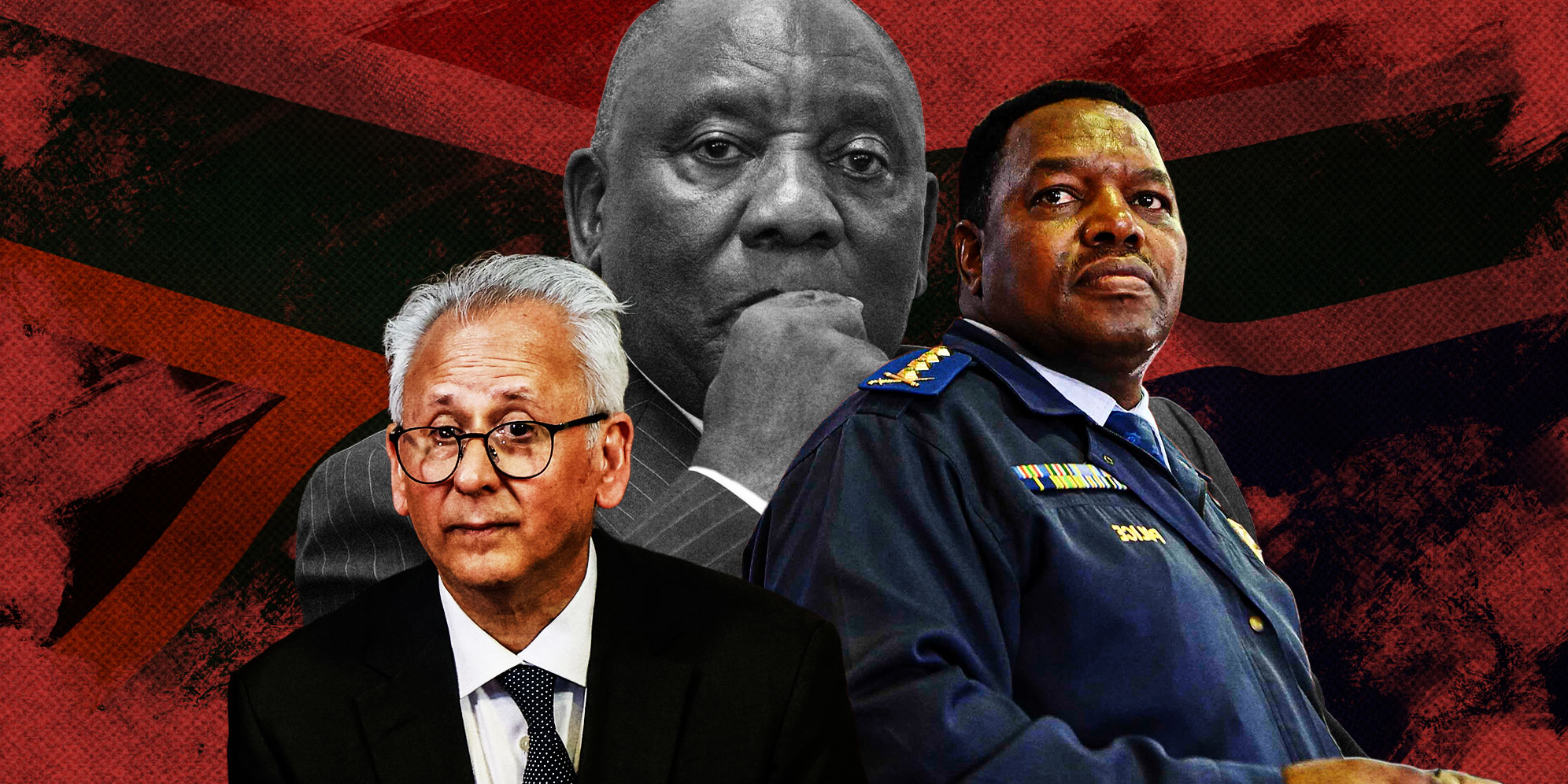President Cyril Ramaphosa has essentially admonished Police Commissioner Fannie Masemola over his actions relating to political killings investigations, part of a seismic and developing law enforcement scandal.
Ramaphosa has expressed himself on Masemola to acting Police Minister Firoz Cachalia.
The saga has been developing over a few days, the latest in a series of high-level controversies involving the South African Police Service (SAPS).
On Friday, 29 August 2025, Cachalia issued a media statement outlining his concerns about Masemola’s actions relating to KwaZulu-Natal’s Political Killings Task Team.
His concerns were twofold.
On the one hand, Cachalia believed that Masemola had acted prematurely when it came to political killings dockets that a Commission of Inquiry was still to investigate, and on the other, he said that Masemola had delayed getting a previously requested report on the task team to him.
Ramaphosa’s ‘displeasure’
On Sunday, two days after Cachalia’s statement was issued, City Press reported that Ramaphosa was “fuming” about Masemola’s actions and that he had conveyed his apprehensions to Cachalia.
Daily Maverick subsequently asked Ramaphosa’s spokesperson Vincent Magwenya about the President’s stance on Masemola.
Magwenya responded to Daily Maverick in the same way he had to City Press, saying that “the President did express his displeasure to Minister Cachalia, at … action taken by General Masemola”
It therefore appears that Ramaphosa’s feelings about Masemola underpinned Cachalia’s statement issued on Friday – the first public indication that there may be friction between the President and the police chief.
Part of Cachalia’s statement emphasised his authority, saying: “I was appointed by the President to ensure the integrity of the SAPS during this difficult time and build public trust in this vitally important organisation.”
This weekend, when asked if Masemola had responded to Cachalia, national police spokesperson Brigadier Athlenda Mathe simply told Daily Maverick: “We decline to comment.”
At the centre of the latest developments involving Ramaphosa, Cachalia and Masemola is KwaZulu-Natal’s political killings task team, which was set up six years ago.
Given how intricate this overall saga is, it will now be dealt with chronologically.
Political killings controversy
In July this year, the SAPS scandal began erupting when KwaZulu-Natal Police Commissioner Lieutenant General Nhlanhla Mkhwanazi held a press conference and made a series of astounding allegations.
Among his broad allegations was that a drug cartel headquartered in Gauteng was controlling a high-level criminal syndicate that extended into the state, including the SAPS.
Mkhwanazi also made accusations against individuals, including deputy national commissioner of crime detection Lieutenant General Shadrack Sibiya and Police Minister Senzo Mchunu, now placed on special leave as a result of this saga.
Among the accusations was that at the end of last year, Mchunu issued a directive to disband the political killings task team in KwaZulu-Natal.
A presentation provided during Mkhwanazi’s press conference said that on 26 March this year, Sibiya, acting on Mchunu’s instruction, had directed that “121 case dockets under investigation” be removed from the team.
Mkhwanazi alleged that since Sibiya’s March directive, the case dockets had been kept at the police head office “without any investigation work done on them”.
He suggested that this had been done to shield politically connected crime suspects.
Both Sibiya and Mchunu denied the accusations of wrongdoing, but were placed on leave.
Sibiya has challenged this via legal processes, and a related court matter may resume this week.
Mchunu’s placement on leave resulted in Cachalia being appointed police minister in an acting capacity.
Ramaphosa, meanwhile, ordered a Commission of Inquiry into Mkhwanazi’s accusations.
Known as the Madlanga Commission, it was meant to start on Monday, 1 September, but has been postponed due to snags in getting infrastructure in place.
This delay resulted in the suspension of two Justice Department officials pending an investigation and disciplinary process.
Dockets directive
From Wednesday to Friday last week, international police organisation Interpol held its 27th African Regional Conference in Cape Town.
On the first day of the conference, Cachalia delivered a speech addressing transnational organised crime during which he referred to corruption and said he was “tired” of “bureaucratic rhetoric and platitudes.”
Masemola also delivered a speech at the conference and on the last day, Friday, 29 August, addressed journalists on the sidelines.
Read more: ‘I’m impatient with bureaucratic rhetoric’ – Cachalia tells global cops he’s tired of lip service
This was where the topic of KwaZulu-Natal’s political killings task team cropped up, along with the allegations by Mkhwanazi during his July media conference that 121 dockets had been removed from the task team.
On the sidelines of the Interpol conference on Friday, a journalist asked Masemola about the status of those dockets.
An eNCA video clip captured his response: “They were traced at the headquarters, and I’ve given [the] directive they return to the province, KwaZulu-Natal, for investigation.”
National Police Commissioner Fanie Masemola says vetting processes will ensure that dockets being returned to the KZN Political Killings Task Team are accounted for. #Today #DStv403 #QuestionThinkAct pic.twitter.com/5NumcYs1d1
— eNCA (@eNCA) August 28, 2025
Masemola said detectives were making copies of the dockets. They were being checked to ensure they had not been tampered with.
“From there, they’ll be sent back to the provincial commissioner [presumably Mkhwanazi], and he will allocate them back to the political killings task team, and investigations will continue,” he told journalists.
The investigations were complex, and related arrests were not expected soon.
Masemola also said that in the next month or so, a political killings task team would be set up in Gauteng to deal with unresolved cases, including taxi-related and political murders.
‘Imprudent tinkering’
It was Masemola’s comments about KwaZulu-Natal’s political killings task team that caught Ramaphosa and Cachalia’s attention.
In response to a Daily Maverick query about this on Sunday, Ramaphosa’s spokesperson Magwenya confirmed that the President had alerted Cachalia to his feelings about Masemola.
“The President views it as imprudent for the leadership of SAPS to start tinkering with areas and/or issues that are contained in the allegations made by Lt General Mkwanazi, which are now a subject of inquiry by the Madlanga Commission,” Magwenya said, “notwithstanding the argument that can be posited that it was an administrative action. The fact is, this is no ordinary matter or exercise of administrative powers.
“This is a matter that is now going to be a subject of the commission's investigation. The President expects the leadership of SAPS to cooperate with the Minister and the commission in safeguarding the integrity of the work of the commission.”
[DOWNLOAD]: Judicial Commission of Inquiry into criminality, political interference and corruption in the Criminal Justice System arising from the specific allegations made public by Lieutenant
General Nhlanhla Mkhwanazi on 6 July 2025.🔗 https://t.co/YfXZHAoTrX pic.twitter.com/CRgSHKQvSa
— The Presidency 🇿🇦 (@PresidencyZA) July 23, 2025
Simply put, this means that Ramaphosa is worried that Masemola is prematurely dealing with the KwaZulu-Natal political killings task team’s dockets, an arena that the postponed Madlanga Commission is meant to investigate.
It also means that investigations that the dockets are linked to may be halted until after the Madlanga Commission hearings, or until after it makes findings.
On Sunday, in response to Daily Maverick, Magwenya also said that Ramaphosa expected Masemola and Cachalia “to maintain a professional and collegial relationship at all times”.
Cachalia’s concerns
Cachalia’s statement on Masemola, issued on Friday, suggested some tension between them.
It showed that Cachalia shared – or was conveying in his own name – Ramaphosa’s concerns that Masemola was acting prematurely on issues the Madlanga Commission was set to investigate.
Cachalia’s statement said that shortly after he was appointed as acting police minister, he had asked Masemola to “furnish him with a detailed report on the task team – a report which is yet to be submitted”. (The “task team” is presumably KwaZulu-Natal’s political killings task team.)
Cachalia added: “I have requested the national commissioner to submit his report without further delay.”
“I said yesterday and I will repeat again today, as a country committed to the rule of law, to procedural fairness and to transparency, we will ensure that the allegations made around corruption in the upper echelons of the South African Police Service will be fully ventilated in… pic.twitter.com/6iV9UQUDbn
— The Presidency 🇿🇦 (@PresidencyZA) July 17, 2025
This suggests Masemola did not promptly respond to Cachalia’s request for the report, to the point that he has now needed public prodding.
Cachalia’s statement said he understood that allegations about the task team were of public interest and said the Madlanga Commission was set to investigate them.
“It is a concern, therefore, that steps are being taken in relation to this matter before the commission has had a chance to investigate the issues surrounding the task team,” Cachalia said.
This statement, which outlines Cachalia’s stance on Masemola, shared with Ramaphosa, is what the national police commissioner declined to comment on at the weekend. DM





 Illustrative Image: President Cyril Ramaphosa. (Photo: Ashraf Hendricks) | Acting Minister of Police Firoz Cachalia. (Photo: Gallo Images / Phill Magakoe) | National Police Commissioner Lieutenant General Fannie Masemola. (Photo: Gallo Images / Volksblad / Mlungisi Louw) | South African flag. (Image: Freepik)
Illustrative Image: President Cyril Ramaphosa. (Photo: Ashraf Hendricks) | Acting Minister of Police Firoz Cachalia. (Photo: Gallo Images / Phill Magakoe) | National Police Commissioner Lieutenant General Fannie Masemola. (Photo: Gallo Images / Volksblad / Mlungisi Louw) | South African flag. (Image: Freepik)